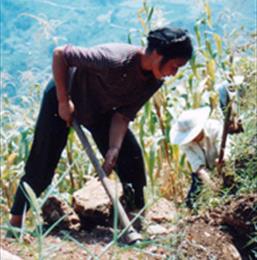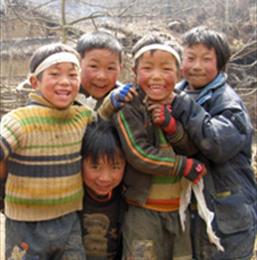Participatory Approach
Partner Organisation
DORS made initial contact with Sichuan Provincial Poverty Alleviation Office (PAO) in 1996, when we informed them of our interest in helping alleviate poverty in the province. Our agreement with the PAO enables DORS to design and implement small-scale poverty alleviation projects in Hanyuan County. The PAO helps DORS arrange visas and permits for foreign staff. DORS was introduced to Hanyuan County Government through the Provincial PAO. In Hanyuan, a new county level PAO was set up in Jan 1997 as DORS arrived to begin work. Our projects have the strong support of the Sichuan Provincial Poverty Alleviation Office. Hanyuan PAO assist DORS in carrying out the projects, for example by introducing us to the various townships, providing transport, etc. Various other local government departments have agreed to provide assistance, for example the Animal Husbandry Bureau and the Agricultural Development Office. DORS are guests of the PAO, and the County Government.
DORS Projects Village Selection and Process
DORS first selected the locations for the projects from amongst 28 'particularly poor' villages, which were designated by the County PAO on criteria specified by the Provincial PAO. Besides that, DORS surveyed and studied other remote villages, which were not counted in the ‘particularly poor’ standard but are nevertheless very poor. The projects are implemented by DORS development workers, who live in Hanyuan County. DORS' development workers are involved in all stages of project design, implementation and monitoring. In 2000 DORS also started working in 8 villages in neighbouring Ganluo County. In the first ten years DORS has implemented over 200 projects in 37 villages include Hanyuan and Ganluo county.
DORS looks at a village as an entirety and together with villagers, works out a plan of project components suitable for that village, to improve the overall conditions - an integrated approach with the village as the focus. A typical project in a village is set up first through a formal introduction from the PAO, visiting the township, meeting with township officials and village leaders for initial discussion, before going to the village. DORS then conducts a baseline study to learn more about the village, the people, specific problems encountered etc. A baseline study often takes several days, (and two or more trips to the village) and includes:
- observation of village and village resources, farming, households, gender divisions, forms of income generation.
- discussion with village leaders and village group leaders
- informal discussions with groups of people in the village
- household interviews with a sample of about 20% of households for detailed household economy information.
- Identification of particularly poor households and disadvantaged groups.
Needs Assessment - is undertaken either as a separate study or at the same time as the baseline study. For example, if water is a problem then we will conduct a separate study on water needs, finding out what people are doing now, and how they have organised themselves, what they think is needed to solve their existing difficulty, whether they would be interested in working on the project etc.
Prepare a village development plan – together with the villagers a village development plan is prepared where the possible components are discussed and agreed on with a draft timescale for implementation, and outline budgets including contributions from the villagers, DORS and local government or other parties
Plan the specific project component - obtaining local expertise as necessary or include training of villagers in that skill. The project is designed in the village with the villagers. Aiming to produce a design that they are happy with, ensuring everyone in the village has a chance to review the proposals.
Draw up an agreement - with the village or township to implement the component, setting out responsibilities, schedules etc. The village or hamlet will be basically responsible for the construction work, managing the project, buying materials etc. This is signed by all parties and the first payment made according to the villages' chosen schedule. Sometimes guarntees are collected at the start of a project and local contributions are collected. Payments or materials go direct from DORS to the village. The PAO also approve the agreement between DORS and the village. In the case of rural credit, women organise into groups to guarantee each others' loans and sign an agreement with DORS. Then the loans are disbursed.
Monitoring and Evaluation- DORS has an overall plan for the monitoring and evaluation of each village. The first stage is the baseline study. Frequent visits are made to the project villages to monitor progress. If problems arise or advice is needed, the villagers can come to DORS' office. On completion of a project, an evaluation survey is completed, where lessons are leanrt for future projects, and any problems are rectified.
Project progress reports - are used to note any progress that occurs and are made upon each visit or after any requests from the village for assistance. They are also used to note advice from technical consultants. After each milestone DORS visits the village and reports on the situation. All receipts are checked. Open meetings are held in the village for anyone interested, to discuss the progress of the project and air any grievances. In these DORS encourages villagers to solve any problems themselves, but may intervene if necessary. Upon completion of a project DORS writes a final report. This is a follow-up to the baseline study, revisiting the original households, and quantifying the changes, but also hearing opinions on the changes the project has brought.
DORS Approach
Learning We are learning all the time from the villagers. We cannot hope to fully understand the life and difficulties in the villages but we are gaining experience all the time. We are aware that we are outsiders and are seen as outsiders. However, we are guests in their village, not experts come to tell local people where they have been going wrong.
Taking time By being based in Hanyuan we have time to spend in the villages. After visiting several times people are convinced that we are genuinely concerned with their views and not just in getting the project completed. We listen to villagers' opinions. We especially try to make contact with those people not normally so visible in a village such as women and the elderly or those with disabilities. By having informal meetings and plenty of time to get to know people, we can learn much more about life in the villages and what the main concerns are, also we can see how the leaders get on with various groups in the village. We encourage people to feel themselves full owners of the project, to take their own decisions and to feel the project belongs to the village not to DORS. We also encourage as many people as possible to be involved, in an atmosphere of openness.
Priorities
DORS' priorities at present are to facilitate village or hamlet based projects that are successful and are to the satisfaction of the villagers concerned. We specifically target the poorest with our projects and their needs take priority where appropriate. We are careful to check out details ourselves, looking, and asking and repeating everything we hear. We do not assume one person's opinions belong to all.
Maintaining good relations with Local Government
This is an important part of our work. Only through the help and co-operation of the PAO and County Government can we implement projects successfully.


